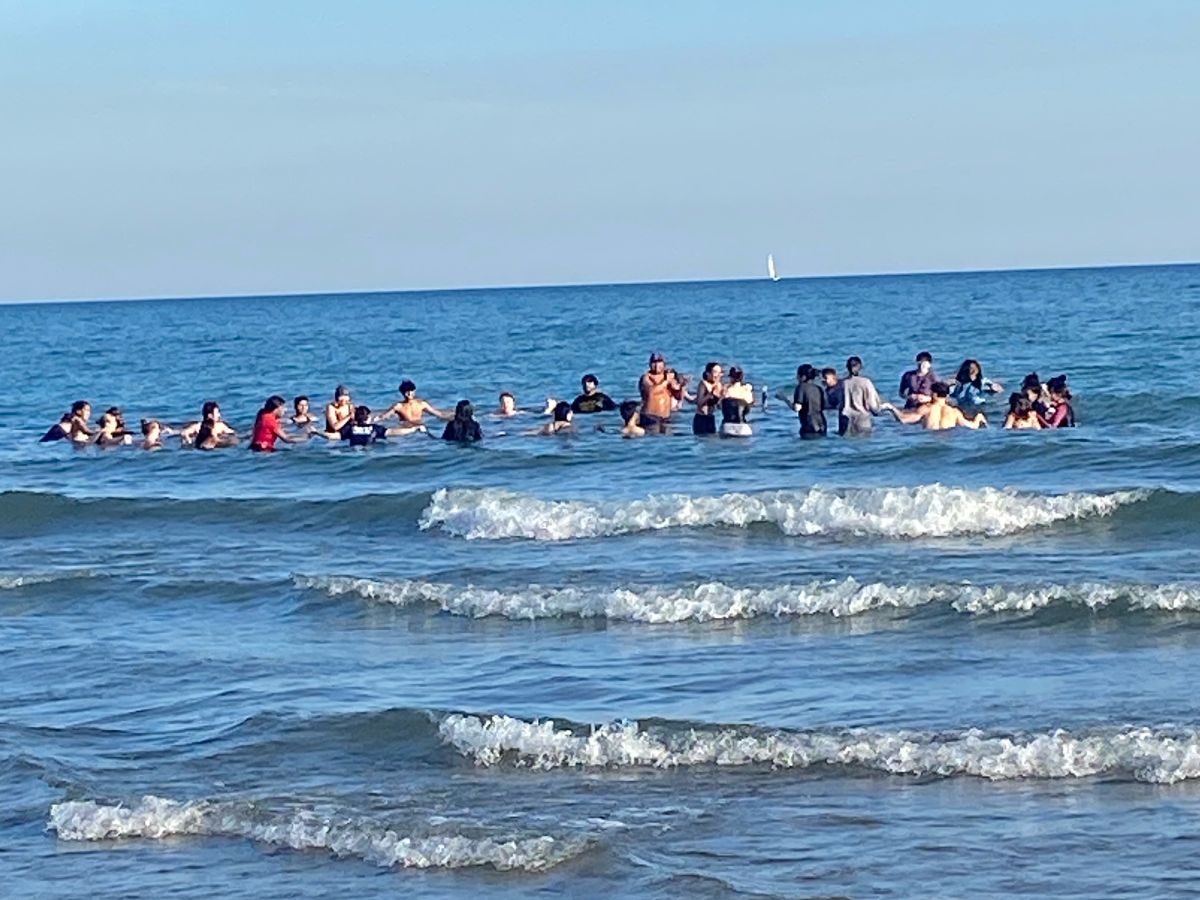Human Resources Management students face the cold

Dr. Ellen Choi had a unique approach to teach her Human Resources Management students about self-awareness, self-regulation and stress management: she invited them to wade into the lake at Toronto’s Ashbridges Bay in November with experts from Unbounded (external link, opens in new window) .
Empirically, cold exposure has links to reduced anxiety and depression, improved sleep quality and a number of other benefits related to metabolic rate, decreased inflammation, and increased immune function. But the icy experience also provides participants with a lesson about facing challenges, pushing their comfort zone and working in teams, too.
“Cold exposure has mostly been studied from a physiological and health perspective. Studies have found it increases serotonin and dopamine production, for instance, which has implications for mood,” explains Dr. Choi, Assistant Professor, Organizational Behaviour and HR Management, Ted Rogers School of Management. “But, cold plunging also has implications for work and life because it invites us to embrace discomfort, rather than avoid it, and gives people the chance to transcend their own self-imposed limits.”
Dr. Choi wanted to include a cold water plunge in her Managing Interpersonal Dynamics and Teams (MHR741) course because the class covers topics such as self-awareness, emotion regulation, empathy, emotional intelligence, communication and conflict resolution. In addition to learning about the theory of self-awareness, self-regulation and stress management, she says taking ‘the plunge’ into cold water in the great outdoors invites students to experience themself and apply the lessons from class, moment-to-moment, in real life.
“When you drop into cold water, the fight-flight response gets activated in the nervous system and instead of thinking non-stop like we usually do, all you can do in the moment is keep breathing,” Dr. Choi explains. “This gives students exposure to hormetic stress, which is the ‘ideal’ level of exposure to stressors in that it represents a sweet spot between being underchallenged and distressed. Importantly, it enables students to have a safe and controlled challenge where they can face and conquer their anxiety and fear in two minutes or less.”
Supporting one another
Across the two sections of Dr. Choi’s class, about 150 students went to Ashbridges Bay in mid- November for the exercises and breathwork component, and half of them bravely forged ahead into the water. Going into the water was optional, and students who did not participate in the plunge were asked to support their team before, during and after the plunge, which allowed them to practice the communication, empathy and compassion skills that were discussed in class.
“A great deal of this class invites students to examine their own self-talk and limiting thoughts that might prevent them from stepping into the role of a leader,” says Dr. Choi. “Cold exposure gives students the opportunity to get outside of their own thoughts, expand their comfort zone and see how they regulate their own thoughts and feelings in order to meet the challenge before them.”
“I expect students will walk away from this with lived experience that they can do hard things when they put their mind to it,” she explains. “In a world where we avoid discomfort at every turn, I hope this gives them the confidence to engage with life's challenges beyond the classroom.”
Lived experience
Matt McLeister was one of the students who participated in the cold water plunge. “Just because something is hard, it doesn’t mean it’s not worth doing,” he says. “I know that I’m a capable person, but I’ve been struggling a lot lately and I stand in my own way too often.”
“It felt good to be able to do something that truly felt like a fresh start and a way to break free of that funk,” he explains. “This was honestly probably the best experience I’ve had in university, and I feel grateful for having been involved.”
Student Humaira Rahman was happy to get out of her comfort zone as well, pointing out that what she thought would be a “once in a lifetime” moment turned out to be something she would do again. “I truly am feeling inspired and almost as if this has woken something in me that I haven’t felt in a long time,” she explains.
Abicha Vinayagamoorthy shares this sentiment, saying, “It was such an exciting and uplifting experience, which I will forever be grateful for. The joy and peace I felt during the whole duration of stepping foot on to Woodbine Beach was amazing.”
“From what I've observed in cold exposure experiences with groups is an almost instantaneous sense of belonging and self-efficacy,” Dr. Choi says. “This feeling that ‘We can do hard things’ and ‘OMG, we did it!’ is so critical in an age where numerous studies have emphasized that we are a society that is currently plagued by anxiety, loneliness and burnout. I imagine student teams will form deeper bonds that I hope continue to grow after the course comes to an end.”